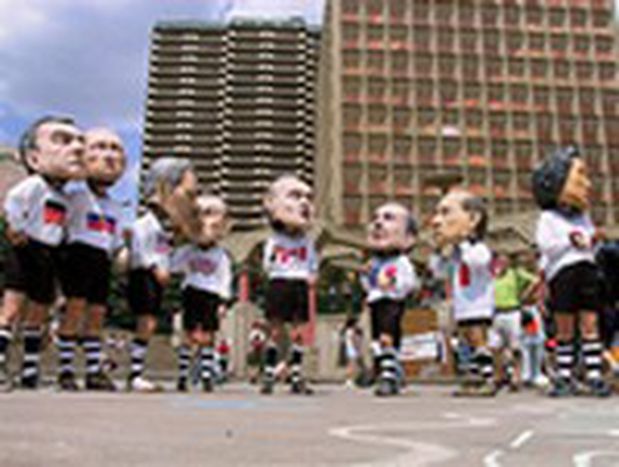
Is Russia at tipping point?
Published on
Translation by:
 eleanor forshaw
eleanor forshaw
Anarchists, local resistance associations and NGO workers are coming together to work for a common cause – that the Kremlin acknowledges the sudden increase in poverty in Russia
April 2005 saw the first Russian Social Forum. 750 people came together at the University of Moscow. While this might not seem much in comparison with the hordes who attend the World Social Forum in Porto Alegre each year, it indicates the beginning of the organisation of Russian civil society.
This first forum in turn sprouted “regional resistance forums.” These forums, Soviets of Social Solidarity (SOS), bring together work organisations, human rights activists, associations for the victims of Chernobyl and a myriad of other groupings. The goal: making the Kremlin aware of the problems in Russia.
This social organisation is growing, according to Karine Clément, a French researcher at the Institute of Sociology and the Science Academy in Moscow, despite, “attempts to toughen up the legislation on social movements and NGOs.” For instance, in November 2005 President Putin tried to put in force a law making it forbidden for NGOs to receive financing from outside the country. The law was retracted after international and national opposition.
Feeling the tension
“This movement is explained by worsening living conditions for the poorer Russian people, which is in turn a direct consequence of the suppression of the social protection systems that was in effect during the Soviet era,” says Clément. “In a country where a large proportion of the population lives on or beneath the poverty line, those guarantees represented a safety net for the majority of families, who cannot access treatments, education, transport or accommodation on their salaries alone.”
In summer 2004 and winter 2005, large demonstrations broke out over the reconsideration of free access to public transport and subsidised drugs. These protests served as a catalyst for the movement. Faced with the sheer magnitude of the protests, Putin was forced to retract some of the legislation. However, a wave of privatisation of social housing soon followed. This sparked even more unrest as a large number of young workers were swindled by estate agents who were supposed to collect the funds for the construction of new private apartment blocks, which never saw the light of day.
The difficulty of establishing an opposition within the political system is aiding the construction of the movement. As dissidents are suppressed and removed from political power, people search for another way to have their voice heard. According to Karine Clément, “the Kremlin has created a strong police who repress dissident voices, it practically controls television and has encouraged the creation of a civil society which is for all intents and purposes dominated by President Vladimir Putin.” The reason? Moscow wants to avoid, at all costs, a Ukrainian style Orange Revolution on its own soil.
Attitudes to Putin
“The organisation of the first G8 in Russia next month in St Petersburg is an excellent opportunity to unite our energies and to give the world another representation of Russia than that which emerges from Vladimir Putin’s speeches,” said Maxime Egorov, the leader of the national movement against poverty, the Russian platform of the Global Call to Action Against Poverty, an international coalition bringing together 150 million militants in 80 countries.
“We are going to take advantage of the presence of more than 2,000 journalists during the G8 summit to bring the rise in extreme poverty in Russia to the attention of international public opinion. We will also try to put pressure on the Russian authorities so that they act to supply social housing and access to education for everyone,” says Egorov.
Even if he shows a certain suspicion, the founder of Nochlezhka, an NGO working for the protection of those without fixed housing in Russia, believes that the recent initiative by Vladimir Putin, to allow the organisation of large summit of civil society in the shadows of the official meeting, is positive. About 500 representatives of Russian and foreign NGOs met on the 3rd and 4th July in Moscow to take part in the Civil G8 – 2006. “Obviously, we were focussing our energies on the organisation of a counter action against the St-Petersburg summit, but this preliminary meeting was the opportunity to put forward our claims,” he adds.
The Russian anti-globalists are often more pragmatic that their Western counterparts, who tend see the question of poverty as an ideological as much as a practical question. “I admit that I found it strange to see flags of Lenin and Marx when I went to a European forum organised in Athens last spring,” remembers Maxime Egorov. But the East-West boundaries are about to be abolished because each camp “is convinced of the need to fight together with social movements, be they in Western Europe or elsewhere. Poverty is, by its very essence, a universal problem,” concluded Egorov.
Translated from Contestation : le chaudron russe


